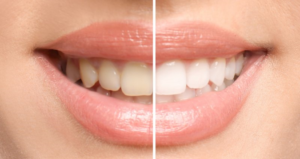
If you’re unhappy with your smile due to the color of your teeth, you aren’t alone—the demand for cosmetic dentistry has roughly doubled in the last few years as patients all over seek services like teeth whitening to brighten their smiles and livelihoods. That said, your teeth might’ve always seemed a little duller than you’d like, even despite your daily oral hygiene efforts. Did you know this might have something to do with your genes? Here’s more about this curious link.
How Can Teeth Become Stained?
Teeth can become stained for a variety of reasons, but generally, the type of discoloration can be categorized into two different kinds: extrinsic and intrinsic. The former has to do with surface stains on the enamel, the outermost layer of teeth, while the latter refers to stains that exist in the dentin layer, which lies underneath the enamel.
Extrinsic stains are typically caused by certain foods, drinks, and consumables. Coffee, tea, red wines and sauces, and cigarettes are the main offenders, but there are numerous other things out there that can cause extrinsic staining. It also often occurs due to chronically poor oral hygiene. Intrinsic stains, however, are often caused by factors such as age, certain medications, overexposure to fluoride, or even dental trauma.
Can My Genes Influence the Color of My Teeth?
Just as they influence the color of your eyes, hair, and skin, your genes can also influence the shade of your teeth. It’s possible to simply be born with thicker enamel, which might make your teeth seem naturally whiter. On the other hand, you might have less enamel, which causes the underlying dentin layer to be more visible.
It’s also possible for you to be born with a genetic condition that predisposes your teeth to discoloration:
- “Amelogenesis imperfecta” causes yellow-brown tooth discoloration and soft, fragile enamel that’s prone to pitting or grooving. This can also increase a person’s risk of tooth decay and heighten the chances of a tooth breaking.
- “Dentinogenesis imperfecta” is another inherited genetic condition that causes grayish, transparent tooth enamel and weak, brittle teeth. It can affect both baby and permanent teeth.
Can Teeth Stained Due to Genetics Be Whitened?
Regardless of how your teeth have been stained—even if it’s due to genetic factors out of your control, teeth whitening is a viable option for most patients. Most dentists offer numerous types of cosmetic services, including teeth whitening, that are capable of addressing both intrinsic and extrinsic stains. And for patients with discolored and weakened teeth, such as those suffering from genetic conditions, solutions that are more restorative in nature can be employed such as veneers or crowns. So long as you’re in adequate oral health, your teeth can easily be made to look their best—and your confidence will soar!
About the Practice
Our team here at Community Dentists of Worcester has proudly assisted patients and families in Worcester, MA, and the surrounding area for several years, offering a wide range of services including numerous life-changing cosmetic options such as teeth whitening. If you have any questions about the blog or you’d like to inquire about teeth whitening, feel free to visit us online or give us a call today for further information: (774) 371-4131.






